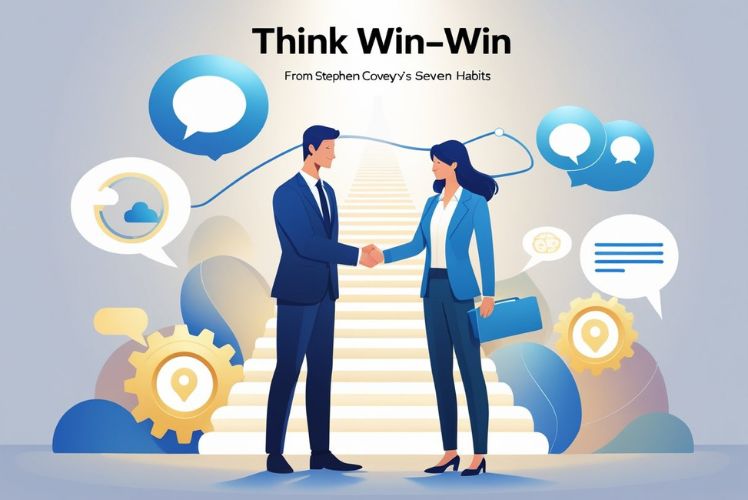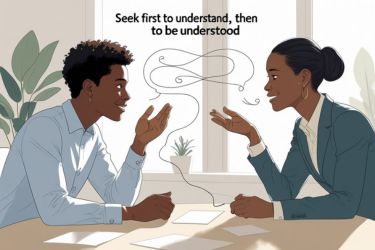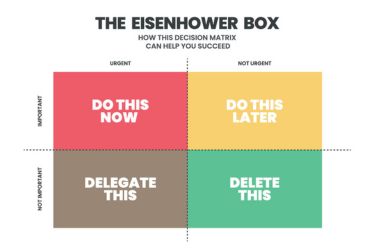"Think Win–Win", the fourth habit from Stephen Covey’s The 7 Habits of Highly Effective People, teaches us to look for solutions where everyone benefits, not just one side. Instead of thinking life is a competition, we focus on cooperation, trust, and mutual respect in our daily relationships. This mindset helps us work better with others, whether at school, work, or at home.

By aiming for win–win, we stop seeing situations as a fight between winners and losers. We understand that real success happens when everyone feels valued and committed to the outcome. This habit encourages us to balance courage and kindness, making it easier to solve problems and build strong connections with people around us.
Key Takeaways
- "Think Win–Win" is about creating solutions where all sides benefit.
- Adopting this habit helps improve teamwork and relationships.
- Balancing courage and consideration is key to practising Habit 4.
Understanding 'Think Win–Win' in Context

When we practise “think win–win”, we approach life and work with the aim of mutual benefit. This habit asks us to value both our needs and others’ needs, encouraging strong human interaction based on respect and fairness.
The Principle of Mutual Benefit
Win–win is about seeking solutions that allow everyone involved to gain, rather than one person winning at the expense of another. We strive to create outcomes where both sides feel respected and satisfied. This does not mean giving in or being overly agreeable.
Instead, we listen closely to what others want and honestly share our own interests. This results in agreements, deals, or plans that meet the needs of both parties. For example, when two people work together on a project, a win–win approach would involve balancing each person's skills and goals to reach a result that benefits both.
Key Traits of Win–Win Thinking:
- Openness to new ideas
- Willingness to negotiate
- Focus on fair solutions
Mutual benefit builds trust and respect. Over time, people are more willing to work with us if they know we value their success as much as our own.
The Shift from Competition to Collaboration
Often, we see others as rivals and believe there is only one winner. This competitive thinking can lead to conflict, resentment, and broken relationships. Win–win replaces competition with collaboration. We view colleagues, friends, and even opponents as partners.
When we collaborate, we share skills and ideas to solve problems. We pool our strengths to get better results than what we could achieve alone. This not only increases creativity but also builds team spirit. In practice, this may look like two departments sharing resources or families working together to create shared goals.
Here is a comparison table:
| Competition | Collaboration | |
|---|---|---|
| Mindset | Win/Lose | Win/Win |
| Result | One gains, one loses | Everyone gains |
| Trust | Low | High |
Shifting to collaboration helps us build stronger, more positive connections and find solutions that stand the test of time.
The Role of Values and Principles
For true win–win outcomes, we need a foundation of clear personal and shared values. Honesty, integrity, and fairness must guide our choices. If we act out of self-interest alone, trust breaks down.
Win–win requires us to treat others with consideration while holding to our principles. This “character-based code” means we stay strong and kind, even in tough situations. We do not just agree to please people. Instead, we act in line with what is right.
Examples of core win–win values:
- Fair treatment for everyone
- Upholding promises
- Respect for each person’s needs
By being consistent in our principles, we earn respect and encourage others to do the same. This creates more honest and productive human interactions, both at work and in life.
Key Elements of Habit 4: Think Win–Win

Habit 4, Think Win–Win, is built on strong personal values and a positive view of cooperation. By practising this habit, we create fair solutions, build trust, and foster stronger relationships.
Integrity as a Foundation
Integrity is at the heart of Habit 4. When we are honest and true to our values, others learn to trust us. Trust makes agreements more reliable and helps everyone feel safe during discussions.
Acting with integrity means we do not compromise our principles, even under pressure. We keep our promises and admit our mistakes. Habit 4 is not just about getting what we want but staying true to what is right.
For example, if both sides agree to a plan but we secretly feel it is unfair, our lack of honesty will eventually cause problems. Practising integrity ensures all voices are heard and respected.
A table below summarises key aspects:
| Key Aspect | Description |
|---|---|
| Honesty | Always telling the truth in our actions |
| Reliability | Keeping promises and following through |
| Openness | Sharing thoughts respectfully and clearly |
Courage and Consideration
Both courage and consideration are required for Think Win–Win. Courage allows us to state our needs and stand up for our ideas. Consideration means we listen to others and care about their needs as much as our own.
Effective negotiation depends on finding solutions that meet everyone’s important concerns. We cannot be passive, nor can we demand results only for ourselves. Instead, we balance strength with kindness.
Sometimes, it takes real bravery to discuss disagreements or to admit when our own plan isn’t the best. By blending self-respect and respect for others, our relationships become stronger and negotiations more successful.
Key points to remember:
- Show empathy and listen carefully
- Express views honestly
- Be flexible in reaching mutual agreements
Cultivating Abundance Mentality
An abundance mentality means believing there are enough resources and opportunities for everyone. This approach is different from a zero-sum or scarcity mindset, where one person’s gain is seen as another’s loss.
With an abundance mentality, we look for ways for all parties to win, not just ourselves. It inspires creative problem-solving and long-term trust. When we believe that success is not limited, we are more likely to avoid competition and focus on collaboration.
Habit 4 encourages us to let go of jealousy and think bigger. This mindset creates a safe space for sharing and working together, which leads to shared growth and greater satisfaction for all involved.
Key characteristics of abundance mentality include:
- Openness to new ideas
- Willingness to share success
- Focus on mutual benefit
Contrasting Win–Win with Other Approaches

When we look at different ways to solve disagreements or work with others, it is important to notice how each method affects outcomes and relationships. Some approaches build trust and create value for everyone, while others can lead to unhealthy competition or resentment.
Win/Lose and Lose/Win Paradigms
The Win/Lose mindset is based on the idea that for one person to succeed, the other must fail. This approach often creates tension or rivalry, especially in teams or families. We may see short-term gains, but trust is reduced and people feel less motivated to cooperate.
On the other hand, the Lose/Win paradigm is when a person always gives in to others, ignoring their own needs. This type of thinking usually leads to frustration and lower self-esteem. Over time, important feelings or ideas are not expressed, and relationships can suffer from lack of honesty.
Comparing both to Win–Win, we see that these two methods do not create lasting or positive results. A Win–Win approach means we look for ways that everyone benefits, which helps build respect and good will between people. It requires both empathy and consideration for others, as well as the courage to express our own needs.
The Importance of Agreements and Solutions
When we take a Win–Win approach, the focus is on clear agreements and solutions that work well for all parties involved. We do not just “split the difference” or accept whatever comes first. Instead, we listen to what each side needs and try to understand the real issues behind their requests.
Mutual benefit is key. We aim to create solutions that each person can feel good about. This often means slowing down, asking questions, and being open to creative ideas. A good tool is to list everyone’s interests and then work together to brainstorm possible solutions.
By making fair and clear agreements, we reduce misunderstandings and future conflict. This makes it easier to build lasting success in both work and personal life.
Building Trust in Relationships
The Win–Win paradigm is powerful because it builds trust. When we show empathy and consideration, the other person feels heard and valued. This increases their willingness to cooperate with us in return.
Trust does not happen overnight. It grows when people see that we do what we promise and consider their feelings and needs. Every time we follow through on a Win–Win agreement, it makes our relationship stronger.
If we use Win/Lose or Lose/Win approaches, trust tends to break down. People become guarded or upset, making it hard to achieve strong teamwork. By aiming for Win–Win, we set up a cycle where trust and collaboration grow over time. This is true in friendships, families, and at work.
The Seven Habits and the Path to Interpersonal Effectiveness

Building strong personal habits forms the foundation for effective relationships. When we understand ourselves and take control of our actions, we are better prepared to work with others, create win–win solutions, and achieve shared results.
Private Victory and Public Victory
The foundation of Stephen Covey’s 7 Habits centres on the idea of "private victory" before "public victory". The first three habits—Be Proactive, Begin with the End in Mind, and Put First Things First—focus on self-mastery and personal change.
Private victory means we learn to manage ourselves, set meaningful goals, and act based on our values instead of reacting to events or pressures. When we achieve this self-discipline, we move from dependence to independence.
Public victory follows as a next step. Here, habits like Think Win–Win, Seek First to Understand, Then to Be Understood, and Synergise help us work effectively with others in teams, families, and groups. We learn to cooperate, build trust, and reach agreements where everyone benefits.
Connecting Proactivity to Win–Win
Being proactive is the first habit, and it is essential for achieving a win–win mindset. Proactivity is about taking responsibility for our actions and decisions. We choose how we respond rather than letting circumstances control us.
When we are proactive, we are confident enough to look for solutions that help all parties succeed. This is a change from a competitive approach, where only one person wins. Instead, we look for ways everyone can benefit, whether in work projects, partnerships, or family life.
Key aspects of being proactive and win–win thinking:
| Proactive Person | Win–Win Outcome |
|---|---|
| Acts instead of reacts | Creates mutual benefit |
| Takes responsibility | Builds lasting relationships |
| Focuses on solutions | Increases trust and respect |
The Role of Interdependence and Synergy
Covey’s 7 Habits highlight interdependence as a key stage beyond independence. Once we have mastered ourselves, we can work alongside others to achieve more than we could alone. Synergy, the sixth habit, is the process by which we leverage different strengths and viewpoints to reach better outcomes.
Interdependence requires open communication and valuing everyone’s input. When we think win–win and apply synergy, the group’s result is often greater than the sum of its individual parts. A win–win approach only works if we respect real differences and look for creative solutions together.
Finally, by practising these habits, we build both strong interpersonal relationships and a self-renewing mindset, reflected in the seventh habit—Sharpen the Saw—which keeps our skills and energy fresh.
Developing a Win–Win Mindset in Real Life
To create a win–win mindset, we must look beyond just seeking our own advantage. Growing personal and interpersonal effectiveness means choosing mutual benefit, taking the initiative, and building habits that support long-term success.
Practical Steps for Implementation
Identifying win–win opportunities in our daily life is where we start. When we face a problem or conflict, we ask: Is there a solution where both sides can benefit?
We should listen actively to others, paying attention to their needs as well as our own. This makes it easier to find mutually satisfying outcomes.
Practical strategies include:
- Using clear, honest communication
- Brainstorming together for possible solutions
- Examining agreements to ensure fairness
Bringing time management into the picture, we schedule talks and planning sessions thoughtfully. This helps avoid rushed decisions and creates space to discuss and negotiate respectfully.
A focus on interpersonal leadership means staying calm in disagreement, showing respect, and aiming for genuine cooperation.
Building Motivation and Initiative
Motivation to act on win–win principles comes from our values and goals. We remind ourselves why mutual benefit is better: stronger trust, reduced conflict, and longer-lasting relationships.
To take initiative, we practise these habits even when it’s easier to choose win–lose or compromise. We set specific goals, like “seek one win–win outcome each day,” to keep ourselves accountable.
Ways to boost motivation and initiative:
- Celebrate small successes with our team or family
- Review positive results from previous win–win decisions
- Learn from setbacks without blaming others
As leaders, we model enthusiasm and fairness, inspiring others to try the win–win approach as well.
Sustaining Results Through Renewal
Sustaining win–win thinking involves the four dimensions of renewal: physical, mental, social/emotional, and spiritual.
Physical renewal means taking care of our bodies, as stress can reduce our patience and empathy.
Mental renewal is ongoing learning—reading, attending workshops, or reflecting on our interactions.
Social/emotional renewal is about maintaining relationships through trust, respect, and open dialogue. We nurture these daily.
Spiritual renewal comes from reflecting on our guiding values and purpose, keeping our commitment to mutual benefit strong.
By making regular time for renewal, we protect ourselves from burnout and maintain high personal and interpersonal effectiveness.
Frequently Asked Questions
We can apply "Think Win-Win" in many practical ways. It affects how we collaborate at work, interact with others, and solve problems together.
What are some practical applications of the 'Think Win-Win' habit in workplace collaboration?
We create solutions where everyone benefits, not just a single person or group. For example, during a team project, we can set clear goals together, ensuring each person's input is valued.
By listening to each other and focusing on shared goals, we build trust. This means fewer conflicts and more productive teamwork.
How does Habit 4 influence interpersonal relationships according to Covey?
Covey teaches us that healthy relationships rely on respect and mutual benefit. "Think Win-Win" encourages us to consider what both sides need.
When we seek agreements that benefit everyone, our connections with colleagues, friends, and family grow stronger and last longer.
Could you provide a summary of the 'Think Win-Win' concept under the Seven Habits framework?
"Think Win-Win" is Habit 4 in Stephen Covey's framework. It means seeking outcomes where all parties feel satisfied and no one loses.
We aim for solutions that build trust and cooperation instead of competition or rivalry.
What are examples of 'Think Win-Win' situations in an educational setting for students?
Students can use "Think Win-Win" when working on group assignments. We can split tasks in a way that matches each person's strengths, making sure everyone succeeds.
If two students want the same role in a project, we can help them find ways to share or alternate duties so both feel included.
In what ways can 'Think Win-Win' be integrated into team-building activities?
We can design games or exercises where teams must cooperate to complete challenges. Instead of beating other teams, the focus is on everyone reaching the goal together.
By encouraging open discussion and fair sharing of ideas, we make sure team-building is fun and inclusive for all.
What are some notable quotations that encapsulate the essence of the 'Think Win-Win' philosophy?
One well-known quote from Stephen Covey is, "Win-win is a belief in the Third Alternative. It’s not your way or my way; it’s a better way, a higher way."
Another is, "Win-win sees life as a cooperative arena, not a competitive one." These statements highlight the balance and mutual respect at the heart of this habit.

















